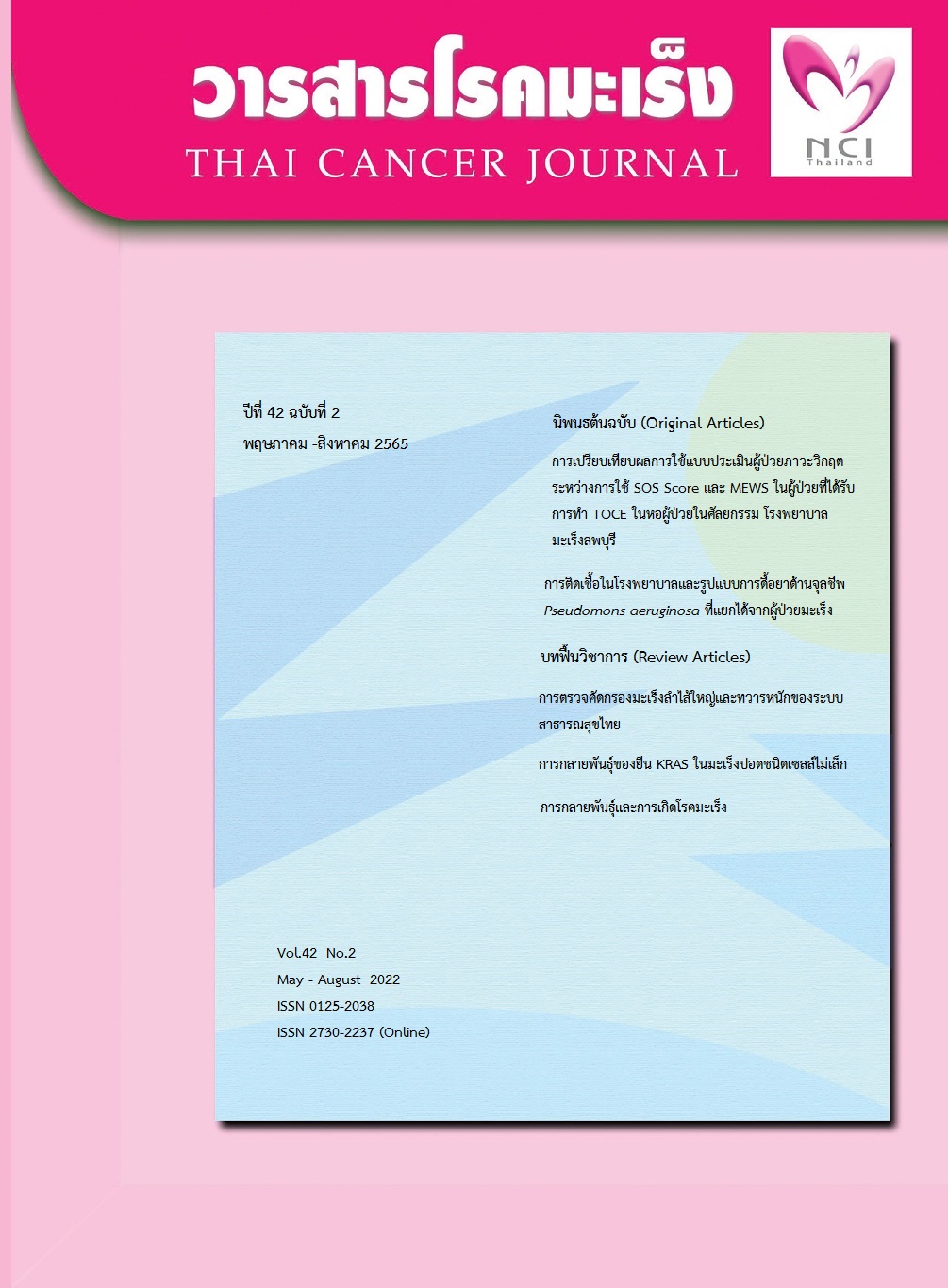COLORECTAL CANCER SCREENING OF THAILAND PUBLIC HEALTH
Keywords:
screening colorectal cancer, fecal immunochemical test, Thailand public healthAbstract
Thailand launch colorectal cancer screening program for population since 2018. It is operated by health network of service plan under control of Ministry of Public Health of Thailand. Target population is healthy people between the ages of 50-70 years. There are about 12.9 million population of the age range in all regions except region 13 (Bangkok) of Thailand.Between 2018-2021, we are targeting 1.3 million population. There are an average of 821,019 participants for stool test (64.9%) in each year. Four years cumulative positive stool test is 141,215 persons. Of these, colonoscopy was performed in 43,211 (30.6%). Polyp detection rate and cancer detection rate is 21.0% and 3.1% respectively.In conclusion, performance of screening colorectal cancer program in Thailand between 2018-2021 is still under standard in the aspect of coverage rate, adherence to colonoscopy and polyp detection rate. However, adherence to colonoscopy and polyp detection rate is improving in the last 2 years.
References
Mandel JS, Bond JH, Church TR, Snover DC, Bradley GM, Schuman LM, et al. Reducing mortality from colorectal cancer by screening for fecal occult blood.Minnesota Colon Cancer Control Study. N Engl J Med.1993;328:136[PubMed:8474513][PMID:8474513]
Mandel JS, Church TR, Bond JH, Ederer F, Geisser MS, Mongin SJ, et al. The Effect of Fecal Occult-Blood Screening on the Incidence of Colorectal Cancer. N Engl J Med. 2000;343(22):1603-7.
Hardcastle JD, Chamberlain JO, Robinson MH, Moss SM, Amar SS, Balfour TW, et al. Randomised controlled trial of faecal-occult-blood screening for colorectal cancer Lancet. 1996;348:1472-7.[PubMed: 8942775][PMID:8942775]
Kronborg O, Fenger C, Olsen J, Jørgensen OD, Søndergaard O. Randomised study of screening for colorectal cancer with faecal-occult-blood test. Lancet. 1996;348:1467–71 [PubMed: 8942774] [PMID: 8942774]
Jørgensen OD, Kronborg O, Fenger C. A randomised study of screening for colorectal cancer using faecal occult blood testing: results after 13 years and seven biennial screening rounds. Gut. 2002;50(1):29-32. doi:10.1136/gut.50.1.29
Lindholm E, Brevinge H, Haglind E. Survival benefit in a randomized clinical trial of faecal occult blood screening for colorectal cancer. Br J Surg. 2008;95(8):1029-1036. doi:10.1002/bjs.6136
Hardcastle JD, Chamberlain JO, Robinson MH, et al. Randomised controlled trial offaecal-occult-blood screening for colorectal cancer. Lancet. 1996;348(9040):1472-77. doi:10.1016/S0140-6736(96)03386-7
Scholefield JH, Moss S, Sufi F, Mangham CM, Hardcastle JD. Effect of faecal occult blood screening on mortality from colorectal cancer: results from a randomised controlled trial. Gut. 2002;50(6):840-44. doi:10.1136/gut.50.6.840
Zheng S, Chen K, Liu X, et al. Cluster randomization trial of sequence mass screening for colorectal cancer. Dis Colon Rectum. 2003;46(1):51-8.doi:10.1007/s10350-004-6496-2
Wong CKH, Lam CLK, Wan YF, Fong DYT. Cost-effectiveness simulation and analysis of colorectal cancer screening in Hong Kong Chinese population: comparison amongst colonoscopy, guaiac and immunologic fecal occult blood testing. BMC Cancer. 2015;15(1):705. doi:10.1186/s12885-015-1730-y
Sharp L, Tilson L, Whyte S, et al.Cost-effectiveness of population-based screening for colorectal cancer: A comparison of guaiac-based faecal occult blood testing, faecal immunochemical testing and flexible sigmoidoscopy. Br J Cancer. 2012;106(5):805-16. doi:10.1038/bjc.2011.580
Telford JJ, Levy AR, Sambrook JC, Zou D, Enns RA. The cost-effectiveness of screening for colorectal cancer. CMAJ. 2010;182(12):1307-13. doi:10.1503/cmaj.090845
Shimbo T, Glick HA, Eisenberg JM. Cost-effectiveness analysis of strategies for colorectal cancer screening in Japan. Int J Technol Assess Health Care. 1994;10(3) :359-75. doi:10.1017/s0266462300006607
Phisalprapa P, Supakankunti S, Chaiyakunapruk N. Cost-effectiveness and budget impact analyses of colorectal cancer screenings in a low- and middle-income country: example from Thailand. J Med Econ. 2019;22(12):1351-1361.doi:10.1080/13696998.2019.1674065
Dan YY, Chuah BY, Koh DC, Yeoh KG. Screening based on risk for colorectal cancer is the most cost-effective approach. Clin Gastroenterol Hepatol.2012;10(3):266-71.e716. doi:10.1016/j.cgh.2011.11.011
Huang W, Liu G, Zhang X, et al. Cost-effectiveness of colorectal cancer screening protocols in urban Chinese populations. PLoS One. 2014;9(10):e109150. doi:10.13 71/journal.pone.0109150
Zauber AG, Knudsen AB, Rutter CM, et al. Cost-Effectiveness of CT Colonography to Screen for Colorectal Cancer. Rockville (MD): Agency for Healthcare Research and Quality (US); January 22, 2009.
Rojanamatin J, Ukranun W, Supaattagorn P, et al (2021). Cancer in Thailand Vol. X, 2016-2018. Bangkok: National Cancer Institute. Available from: http://www.nci.go.th.
HDC Service.ข้อมูลเพื่อตอบสนอง Service Plan สาขามะเร็ง : ประชากรกลุ่มเป้าหมาย ได้รับการคัดกรองมะเร็งลำไส้ใหญ่และลำไส้ตรง (coverage ตามโครงการคัดกรอง service planสาขามะเร็ง).(อินเทอร์เน็ต);เข้าถึงเมื่อ 8 สิงหาคม 2565:เข้าถึงได้จาก https://hdcservicemoph.go.th/hdc/report/report.php
?source=pformated/formatg.php&cat_id=59acae7a68f02c8e2c0cb88dfc6df3b3&id=c9368ec68b5aae4446b802ef018796c 7
Hewitson P, Glasziou P, Irwig L, Towler B, Watson E. Screening for colorectal cancer using the faecal occult blood test, Hemoccult. Cochrane Database Syst Rev.2007;2007(1):CD001216.Published2007 Jan 24. doi:10.1002/14651858.CD001216.pub2
Moss S, Ancelle-Park R, Brenner H; International Agency for Research on Cancer.European guidelines for quality assurance in colorectal cancer screening and diagnosis. First Edition--Evaluation and interpretation of screening outcomes. Endoscopy.2012;44 Suppl 3:SE49-SE64. doi:10.1055/s-0032-1309788
Kastenberg D, Bertiger G, Brogadir S. Bowel preparation quality scales for colonoscopy. World J Gastroenterol. 2018;24(26):2833-43. doi:10.3748/wjg.v24.i26.2833
Bhanthumkomol P, Siramolpiwat S, Vilaichone RK. Incidence and predictors of inadequate bowel preparation before elective colonoscopy in Thai patients. Asian Pac J Cancer Prev. 2014;15(24):10763-10768. doi:10.7314/apjcp.2014.15. 24.10763
Schoenfeld PS, Cohen J. Quality indicators for colorectal cancer screening for colonoscopy.Tech Gastrointest Endosc. 2013;15(2):59-68. doi:10.1016/j.tgie.2013.02.005
Hoff G, Botteri E, Hoie O, Garborg K, Wiig H, Huppertz-Hauss G, et al.Polyp detection rates as quality indicator in clinical versus screening colonoscopy. Endosc Int Open. 2019;7(2):E195-E202. doi:10.1055/a-0796-6477
Williams JE, Le TD, Faigel DO. Polypectomy rate as a quality measure for colonoscopy. Gastrointest Endosc. 2011;73(3):498-506. doi:10.1016/j.gie.2010.08.008
Khuhaprema T, Sangrajrang S, Lalitwongsa S, Chokvanitphong V, Raunroadroong T, Ratanachu-ek T, et al. Organised colorectal cancer screening in Lampang Province, Thailand: preliminary results from a pilot implementation programme. BMJ Open 2014;4:e003671. doi: 10.1136/bmjopen-2013-003671
Lohsiriwat V, Sujarittanakarn S, Akaraviputh T, Lertakyamanee N, Lohsiriwat D, Kachinthorn U. Colonoscopic perforation: A report from World Gastroenterology Organization endoscopy training center in Thailand. World J Gastroenterol. 2008;14(43):6722-25. doi:10.3748/wjg.14.6722
Downloads
Published
Issue
Section
License
Copyright (c) 2022 Thailand's National Cancer Institute Foundation

This work is licensed under a Creative Commons Attribution-NonCommercial-NoDerivatives 4.0 International License.
บทความทีตีพิมพ์ในวารสารโรคมะเร็งนี้ถือว่าเป็นลิขสิทธิ์ของมูลนิธิสถาบันมะเร็งแห่งชาติ และผลงานวิชาการหรือวิจัยของคณะผู้เขียน ไม่ใช่ความคิดเห็นของบรรณาธิการหรือผู้จัดทํา







